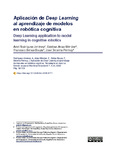Aplicación de Deep Learning al aprendizaje de modelos en robótica cognitiva

Use this link to cite
http://hdl.handle.net/2183/26689
Except where otherwise noted, this item's license is described as Atribucion-No comercial-Sin derivadas 3.0
Collections
- Investigación (EPEF) [590]
Metadata
Show full item recordTitle
Aplicación de Deep Learning al aprendizaje de modelos en robótica cognitivaAuthor(s)
Date
2020-05Citation
Rodríguez-Jiménez, A., Arias-Méndez, E., Bellas-Bouza, F., & Becerra-Permuy, J. (2020). Aplicación de Deep Learning al aprendizaje de modelos en robótica cognitiva. Revista Tecnología En Marcha, 33(6), Pág. 92-104. https://doi.org/10.18845/tm.v33i6.5171
Abstract
[Resumen] El tipo de entrenamiento utilizado para una red neuronal artificial va a depender de factores como: disponibilidad de datos, tiempo de entrenamiento, recursos de hardware disponibles, entre otros. Los entrenamientos pueden ser offline u online. En el presente artículo se experimentan entrenamientos online sobre un robot cuya principal característica es que utiliza un mecanismo cognitivo darwinista para su supervivencia.
El aprendizaje del robot se produce en tiempo real. Este tiene redes neuronales artificiales
profundas para predecir acciones a realizar, se entrena con la menor cantidad de espacio de
almacenamiento y en el menor tiempo posible sin sacrificar confianza de la red neuronal artificial profunda.
Los entrenamientos experimentados son: Online Deep Learning, Online Deep Learning con
memoria y Online Mini-Batch Deep Learning con memoria. [Abstract] The kind of training used for an artificial neural network will depend on factors such as: available data, training time, hardware resources, etc. The trainings can be online and offline. In the current article we experimented with online trainings on a robot whose main characteristic is the usage of a Cognitive Darwinist Mechanism to survive.
The robot learns in real-time. It has deep artificial neural networks to predict actions, it’s trained using the least amount of storage and the training time has to be as fast as possible; keeping high confidence in the artificial neural network.
The experimental trainings are: Online Deep Learning, Online Deep Learning with memory and Online Mini-Batch Deep Learning with memory.
Keywords
Redes neuronales (Informática)
Aprendizaje automático
Aprendizaje profundo (Informática)
Robótica
Aprendizaje automático
Aprendizaje profundo (Informática)
Robótica
Description
Especial Movilidad Estudiantil 7
Editor version
Rights
Atribucion-No comercial-Sin derivadas 3.0
ISSN
2215-3241






